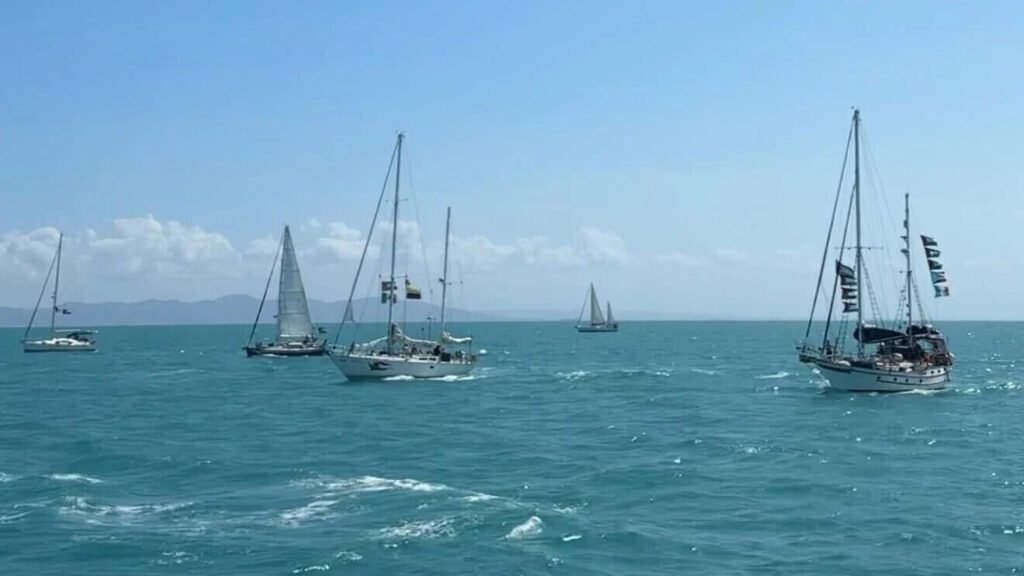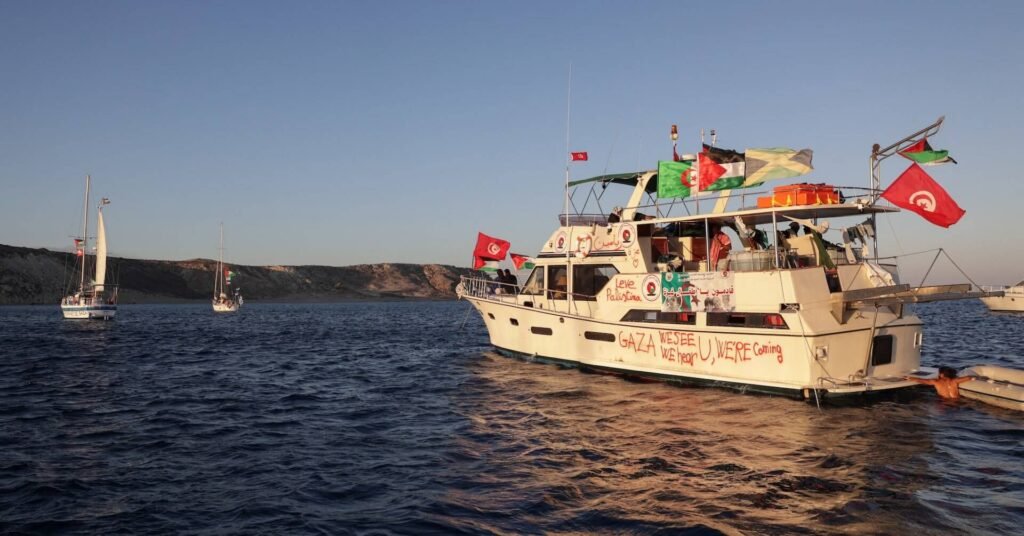The Global Sumud Flotilla tracker at globalsumudflotilla.org/tracker/ monitors vessels heading toward Gaza that were stopped at 3:48am GMT Thursday. All 15 boats faced interceptions by Israeli forces, with a statement that confirmed these actions. Live streams and communications from several ships were lost, making it hard to track their journey. The website added details showing movements beyond normal routes.
This maritime convoy of ships represents a symbolic challenge to the blockaded enclave, with activists aboard determined to reach Gaza’s shores. The mission started with vessels from multiple ports in Spain and Italy before stopping in Greece and Tunisia across the Mediterranean. Despite warnings about violating the lawful blockade, organizers remained focused on delivering humanitarian aid and medical supplies as essentials for Gaza’s population.
INTERCEPTION AND CURRENT STATUS
Israeli forces recently intercepted the flotilla approximately 200 miles off the Gaza coast, effectively stopping its journey toward the blockaded territory. The navy deployed multiple vessels to prevent the boats from reaching their intended destination in this high-risk zone. Passengers aboard reported communications disruption and sightings of shadowy, unlit boats before the actual interception occurred. Forces systematically transferred all people to an Israeli port for processing and potential deportation.
Activists on board described hostile encounters at sea, including suspected drone attacks near Malta and Crete that damaged some vessels. The military operation unfolded safely according to official statements, though tensions remained high throughout. Several boats were forced to withdraw from the convoy due to technical issues before the main interception. This symbolic effort to break the blockade ultimately stopped short of establishing the intended maritime corridor for humanitarian aid delivery (read more).
Key Points from the Incident:
- Flotilla intercepted ~200 miles off Gaza coast.
- Israeli navy sent multiple ships.
- Communications interrupted prior to interception.
- Boats seen without lights trailing flotilla.
- All passengers brought to Israeli port.
- Suspected drone attacks off Malta and Crete.
- Several boats pulled back due to damage/technical reasons.
- Humanitarian corridor attempt was finally blocked.
FLOTILLA PARTICIPANTS AND COMPOSITION
The flotilla brought together 42 distinct activists and volunteers from multiple countries across Europe and beyond. Civilian participants included roughly 200 individuals, with the Greta Thunberg, the Swedish climate campaigner, joining on deck during Tuesday‘s departure from Turkey. This fleet represented a group coordinated through careful tracking systems showing real-time positions. Several vessels—the Alma, Surius, and Adara—carried humanitarian aid and life-saving supplies toward Gaza. The mission aimed to establish a maritime corridor for unarmed participants heading forward despite known risks.
Maritime operations involved video documentation via livestream channels and a website tracker page updated with confirmed positions. Participants sailed from diverse backgrounds, including Colombian nationals and representatives from Ireland, Spain, Italy, and Malaysia. The Global Sumud convoy combined organisers experienced in challenging naval restrictions with first-time participants. Two boats with drones conducted shadowy surveillance as the convoy neared international waters. Communications faced jamming and disruption, yet the board maintained coordination. This attempt reflected coordinated actions across cities like Rome, Buenos Aires, and Istanbul.
Key Facts on Flotilla Volunteers and Composition:
- 42 activists from various nations participated.
- ~200 civilians participated in the mission.
- Greta Thunberg participated from Turkey.
- Aid was carried by ships (Alma, Surius, Adara).
- Mission sought to establish a sea corridor.
- Live tracking and livestreams utilized.
- Volunteers from Colombia, Ireland, Spain, etc.
- Surveillance drones detected near international waters.
- Communications jammed but coordination maintained.
- Support actions around the world in several cities.
ISRAELI RESPONSE
Israel swiftly boarded the vessel after issuing repeated warnings about the illegal breach of its blockade. The Israeli forces acted in international waters, cutting all signals and communications near the coast. Occupation Forces detained participants while statements from military sources justified the interception as necessary security measures. Blockaded Gaza remains under strictly controlled entry points for all supplies and cargo.
Hostile encounters in the Mediterranean had heightened tensions before the actual raid. Unlit vessels were suspected of tailing the flotilla through high-risk waters near Malta and Crete. These attacks forced organizers to withdraw from certain routes prior to the eventual boarding. Sea conditions and distress signals were deliberately blocked, exposing the criminal nature of the operation according to critics.
International Reactions

International reactions to the flotilla incident have been varying across nations. The United Kingdom’s representative formally expressed concern while Turkey issued a call for immediate release of detained participants. Diplomatic tensions formed earlier this week as the zone restrictions claim drew scrutiny from multiple ambassadors. Regional authorities connected to humanitarian channels strongly reject Israel’s unfounded allegations about weapons smuggled aboard vessels.
Several countries where volunteers originated have alleged their citizens face deported status without necessary evidence to prove wrongdoing. The Ministry of Foreign Affairs in Malaysia reported that lawmakers among the detained remain safe and healthy despite restricted communication. Danny Danon at the United Nations faced questioning about why soldiers intercepted the convoy during Yom Kippur holiday observances. International pressure continues building as organisers document the established naval breach of law.
Historical Context
Maritime aid operations to Gaza have formed a significant chapter in Middle East humanitarian efforts, with tensions earlier documented during the 2009 incident that was formally enforced through naval blockades. The Israeli navy has consistently established restricted area protocols, claiming necessary measures to prevent weapons from being smuggled into the zone. Authorities have long maintained that such channels must remain under military control, though international observers believed these actions often extended beyond security law.
The blockade, which authorities alleged was connected to preventing Hamas from receiving support, has sparked ongoing protests across nations who condemn such intimidation tactics. Governments have urged restraint from all parties, with some countries taking diplomatic action by deporting diplomats or severing ties in response to detention practices. This historical pattern reveals how humanitarian mission objectives have repeatedly clashed with military enforcement, creating a cycle where volunteers face arrests despite carrying food and aid rather than contraband—a reality that continues to generate attention from international bodies and monitor groups worldwide.
Read More Articles Here:
Australia vs England Women Highlights: Fierce Rivalry
Women’s Cricket World Cup: Emotional Wins That Inspire
Karachi Braces for Intense Heatwave as Temperature Hits 40°C
Conclusion
Flotilla efforts to break the blockade consistently face interception, yet participants remain determined despite Israeli naval actions. The international community’s response varies in degrees, with some nations condemning the raid while others maintain diplomatic silence. Evidence of coercion and rejection of unfounded claims highlights ongoing tensions surrounding Gaza-bound convoys. These attempts to sail toward the territory, trapped by restrictions on food and goods, continue regardless of past incidents like the Mavi Marmara in 2010.
From 2007 through 2024, examples of smaller flotillas being stopped demonstrate persistent patterns in this conflict. Residents dependent on humanitarian assistance watch as hundreds of activists, including lawmakers, veterans, and organisers from Turkiye, Malaysia, and Americans, risk interception miles offshore. The spokesperson reports that despite soldiers deployed and warnings from the Ministry of Foreign Affairs, progress continues. Israel’s ministry maintains they will stop any breach, while counterparts like PM Anwar Ibrahim and Minister Simon Harris have spoken in the strongest terms about the raid, and President Gustavo Petro expelled Israel’s ambassador. Even during the Jewish holiday of Yom Kippur, the regime faces criticism on platforms like X and Telegram for actions that prove ongoing restrictions.
Zainab Farooq is a dedicated reporter and celebrity wealth analyst with Pakistan Coverage, committed to bringing readers timely and accurate information across diverse topics. With a passion for storytelling and fact-based reporting, she covers everything from celebrity net worth insights and entertainment industry analysis to local Pakistani developments and global trends, ensuring readers stay informed about the stories that shape our world.




